大学英语词汇学习论文
大学英语论文2500字:词汇

大学英语论文2500字:词汇能力与知识的关系,相信大家都很清楚。
知识不是能力,但却是获得能力的前提与基础。
而要将知识转化为能力,需要个体的社会实践。
下面是编辑老师为大家准备的大学英语论文2500字。
一、词汇教学与语音教学相结合学习英语单词,首先是要能正确发音。
如果不能正确朗读单词,不仅人家无法理解你要表达的意思,而且你也无法听懂人家的话。
不能正确发音,既不能很好发展听的能力,也不能顺利地同别人进行交流。
正确发音还有利于学生正确拼写单词。
英语是一种拼音文字,它的发音与拼写之间有着非常的联系。
我们在词汇教学中,先让学生通过听英语单词分辨出单词的读音之后,再进行读音规则的教学,使学生能够根据字母在单词中的读音规律把单词拼写出来。
结合字母音和在其单词中相同读音进行拼读训练。
学习字母A时,可列出lake take name,让学生拼读。
学生在读完一个单词之后,可将辅音变换进行替换练习,如将lake中的“l”替换成b,c,d,f,g ,h,j,m,n,p,r,s,t,以培养学生的拼读能力。
采用类推方式。
如学生已学过farm,在学习,bark,mark这些词时,先让学生复习farm,然后让学生尝试读bark,mark 这些词。
让学生归类。
可让学生对同一字母或字母组合在不同单词中的读音进行归类。
这就解决了学生掌握词汇的一个很重要的问题 --拼写单词。
使学生掌握单词中字母及组合的读音规律,能够做到听词能写, 见词会读。
二、融构词法于词汇教学之中英语是一种适应性和灵活性很强的语言。
在其总词汇量中,除了数量很少的基础词汇是本族语外,大部分词汇是在借用拉丁语词根和希腊语词根的基础上加以英化的。
在课堂的教学中,我们要求学生熟记一些词根。
根据词缀在新词中不同位置,可分为前缀和后缀两种。
前缀改变原词的意思,但通常不改变原词的词性;后缀加在词干的末尾,改变原词的意思,并且在很多情况下改变原词的词性。
借助前缀、后缀、[作者简介] 郭丽杰 (1963- ),女,副教授,研究方向:大学英语教学。
英语词汇学期末论文

英语词汇学期末论文题目:浅析英语词汇巧记法专业:英语班级:13级3班学号:201313010309姓名:黄旷静完成时间:2015年1月14号浅析英语词汇巧记法摘要:词汇是英语学习的基础,没有足够的词汇量就不可能高水平的掌握英语这门外语,而浩瀚的词汇海洋让很多人望而生畏。
尽管花费了大量时间精力去背,记忆的效果却差强人意,原因就在于没有使用科学的方法记忆词汇。
其实,世间万物都是有规律性的,英语单词的组词与构词方法也有规律,了解了它的规律有利于我们有效甚至高效学习英语单词。
为了提高单词记忆的效率,本文从不同方面介绍几种记忆方法。
关键词:词汇科学记忆规律效率一.读音记忆法1.拼读法英语是拼音文字,英语中的单词的读音大多是有规律的,熟悉字母及字母组合的发音规则,掌握正确的拼法与读音之间的关系,可以根据单词的读音,降低记忆难度,正确地拼写单词。
例如ay读[ei]。
带有ay字母组合的词,如say,day,way,pay,may,play,spray,不仅发音容易,而且拼写也没有任何困难。
Sh ch tion ture 等也都有固定读音,ee发音为i:culture 文化pasture牧场mature 成熟的architecture 建筑学带有true的单词也都能很方便的记忆下来2.谐音法尽管有些人认为用这种谐音记忆法记忆单词不科学,不利于正确掌握发音,但实践证明,对尚未掌握外语的构词特点和记词规律的初学者来说,采用谐音法记单词确实能有效地记住一部分难记的单词。
但是,在用谐音法记单词时需要特别注意,绝不可将其作为模仿发音的依据,只能作为记忆单词时的谐音联想手段,以加强记忆,而必须按照单词的标准发音去读记,以避免这种记词法干扰正确发音。
用谐音法记单词是,根据外语单词的读音到中文中寻找与其读音相似的谐音,寻找到谐音与单词的联系。
用这种方法甚至可能达到终身不忘,这也正是谐音记忆法的绝妙之处。
例如:mouth嘴[联想:说话“冒失”的就是嘴]think想[联想:想时要“深刻”]二.联想法1.拆分联想科学研究表明:联想是记忆的基础。
Lexicology and My English Study 英语词汇学论文

Lexicology and My English StudyI. What Is Lexicology?The term lexicology was borrowed from the French word lexicology, which contains two morphemes: one is Greek lexicology, meaning ‘workbook’ or ‘vocabulary;’ the other is French logie, meaning ‘the study or science of.’ So the literal meaning of the term is ‘the science of words.’The term first appeared in the 1820s, though there were lexicologists in essence before the term was coined. Computational lexicology as a related field (in the same way that computational linguistics is related to linguistics) deals with the computational study of dictionaries and their contents. An allied science to lexicology is lexicography, which also studies words in relation with dictionaries – it is actually concerned with the inclusion of words in dictionaries and from that perspective with the whole lexicon. Therefore lexicography is the theory and practice of composing dictionaries. Sometimes lexicography is considered to be a part or a branch of lexicology, but the two disciplines should not be mistaken: only lexicologists who do write dictionaries are lexicographers. It is said that lexicography is the practical lexicology; it is practically oriented though it has its own theory, while the pure lexicology is mainly theoretical.Comprehensively speaking, lexicology is the branch of linguisticsconcerned with the study of the vocabulary of a given language. It deals with words, their origin, development, history, structure, meaning and application. In short, it is the study of the signification and application of words.Ⅱ. Aims and Significance of LexicologyThe aim of the term lexicology is to give a systematic description of the English vocabulary. Concretely speaking, English lexicology offers students an insight into the origin and development of the English vocabulary. It deals with meanings of Modern English words and their changes in the course of historical development. It discusses the problems of word-structure and word-formation in English, including the formation of new words which have appeared since the 1960s. It also it also studies the use of English words, phrases and idioms.The significance of lexicology for language learning is also evident. The term will help the learners to enlarge their vocabulary and improve their ability to analyze and use English words. For instance, the study of new words, synonyms, figures of speech, etc. will arouse the interest of the learners on the one hand, and enhance their ability to choose the correct and expressive words in writing and speech on the other hand.Language learning requires practice. Practice makes perfect. Without practice there would be no theory. English lexicology as a theory of Modern English may be useful in vocabulary study because it derivesfrom practice and should guide practice. Students will use the basic knowledge of English lexicology to understand the material already familiar to them from English classes, and apply it in their further study of English.Ⅲ. Language, Linguistics and LexicologyBriefly speaking, lexicology deals with words. Words are the foundation and core of language. We know that without words, there would be no language, while without language, there would be no linguistics. Therefore, words, that is, lexicology, language and linguistics are very closely interrelated with one another. Before studying lexicology, we should learn about what language is and what linguistics is.Ⅳ. The Connection of Lexicology with phonetics and grammar and stylistics1) With phonetics:Phonetics is the study and systematic classification of the sounds made in spoken utterance, that is, the study of speech sounds. It is closely related to lexicology.Without sound there is no word because every word is unity of sound and meaning.2) With grammar:V ocabulary and grammar are organically related to one another. In learning a language, attention to grammar is as important as attention tovocabulary. Joseph Stalin pointed out that the vocabulary is the building material of a language. The vocabulary of a language assumes tremendous importance when it comes under the control of grammar, which is concerned with the modification in front of words and the combination of words into sentences.3) With stylistics:Stylistics is “the study of optional variations in the sounds, forms, or vocabulary of a language as characteristic of different uses of language, different situations of use, or different literary typ es.” Lexicology studies stylistics variants on the basis of meanings of words and their changes: synonyms, antonyms, figures of speech, etc.Stylistics is concerned with language variety differing according to use rather than user. The same user may use different varieties for different purposes, different situations, in conversation with different people, to produce different effects. The same subject matter can be expressed in different styles.Ⅴ. Two Approaches of the study of LexicologyThere are two main approaches to the study of lexicology, that is, synchronic and diachronic.The term synchronic means describing a language as it exists at one point of time. The term diachronic means concerned with historical development of a language.A synchronic approach is an approach to the study of a language at one period of time, whereas a diachronic approach is an approach to the study of the change in a language that took place over a period of time. Ⅵ. The Division of the History of the EnglishThe history of the English language is divided into three periods.1) The period from 450 to 1150 is known as the Old English or Anglo-Saxon period. It is described as the period of full inflections, since during most of this period the case endings of the noun, the adjective, and the conjugation of the verb were not weakened.2) The period from 1150 to 1500 is known as the Middle English period. During this period the inflections, which had begun to break down towards the end of the Old English period, became greatly reduced, and it is known as the period of the leveled inflections.3) The period from 1500 to the present day is called the Modern English period. A large part of the original inflectional system has disappeared, and it is known as the period of lost inflections.Ⅶ. The Main Processes of English Word-formationThere are four main types of word-formation in English:1) Prefixation:Affixation includes prefixation and suffixation. Affixation is the morphological process whereby grammatical or lexical information is added to the base.Affixation has played an active part in the course of the development of the English language. It is not only an age-old, but also a productive method in English word-building.What is prefixation?Prefixation is a main type of word-formation putting a prefix in front of the base, sometimes with, but more usually without a change of word class, e.g. dislike (dis + like).2) Suffixation:Suffixation is a main type of word-formation, putting a suffix after the base, sometimes without, but more usually with a change of word class, e.g. frankness (frank + ness)The primary function of prefixes is to effect a semantic modification of the base, and the chief function of suffixes is to change the word class of the base, although suffixes have only a small semantic role. Therefore suffixes may be classified into four categories according to the word class.3) Conversion:Conversion (or full conversion) is a main type of word-formation assigning the base to a different word class with no change of form. For example, the verb release is converted to the noun release.In the English language conversion is unusually prominent as a word-formation process. Of course, conversion, like other main types ofword-formation, is treat as a process now available for extending the lexical resources of the English language.There are two kinds of conversion: full conversion and partial conversion.4) Compounding:Compounding is a main type of word-formation adding one base to another, such that usually the one placed in front in some sense subcategorizes the one that follows, e.g. blackbird, etc.Compounding can occur not only in the three major word classes, nouns and, to lesser extent, adjectives, and, to least extent, verbs but also in other word classes: prepositions, such as into, within, by means of, instead of, etc. pronouns, such as each other, one another, anybody, someone, herself, itself, etc. and adverbs, such as headlong, somehow, somewhere, upside down, inside out, etc.A compound is a lexical until consisting of more than one base and functioning both grammatically and semantically as a single word. Compounds usually comprise two bases only, however internally complex each may be.Ⅷ. English IdiomsIdioms are very important and extremely interesting part of language. They are commonly used in all styles of language: informal and formal, spoken and written. If we can understand and use idioms correctly, ourlanguage skills increase constantly. One important problem our students have with idioms is how we understand them in our daily study.The best way to understand an idiom is to see it in context. Let us give an example below.If someone says: This ti n opener’s driving me round the bend! I think I’ll throw it away and get a new one. Then the context and common sense tells us that drive round the bend refers to something different from driving a car round a curve in the road. So the context points out that the tin opener is not working properly and that it’s having an effect on the person using it.Drive or send sb. round the bend is an idiom used as an informal style meaning ‘to make someone very bored or very angry.’Ⅸ. British and American EnglishGrammatical differences between British and American English are few. The more noticeable differences are phonetic and especially lexical. It does not seem likely that distinctions between British English and American English will become more extensive. On the contrary, as the modes of communication have improved, the tendency is towards uniformity and better understanding between the people of the two countries.But why does American English differ from British English?There are two reasons for this.Firstly, British English itself changed in the course of time. All languages change as time passes. English is no exception. That is why Chaucer’s English is different from Shakespeare’s English, and why Shakespeare’s English is different from contemporary Engli sh.Take the following English word borrowed from Latin and Greek for example.Such words as apparatus, complex, focus, maximum, minimum, series, etc. appeared in English only after the year 1600.In the past fifty years British English has adopted a great number of words that originated in American English.Words like cafeteria, highlight, hotrod, OK, etc. are example.Secondly, American English has acquired a character of its own. It reflects the growth, development and history of American society.In the earliest period a number of words denoting places, plants, animals, tools, and customs which existed in America were added to the English language, e.g.Hickory—a type of tree of North America which provides hard wood and bears nuts.Moose—a type of large deer, with very large flat horns, that lives in the northern pert of America.The above-mentioned words belong to American English and were borrowed from American Indian languages.After the American Independence a number of words related to institutions appeared, e.g. assembly, congress, president, representative, vice-president, etc.Strictly speaking, British English is the English spoken by the great majority of educated people in South and Southeast England, especially in London and its vicinity. BrE or BE is shot for British English. American English is General American spoken by the great majority of the American people. AmE or AE is short for American English.References:I.Chengzhang Lin﹠Shiping Liu An Introduction To EnglishLexicology, WuHan University Press FourthII.Wikipedia。
英语词汇学的论文怎么写[共5篇]
![英语词汇学的论文怎么写[共5篇]](https://img.taocdn.com/s3/m/6ecb7b3191c69ec3d5bbfd0a79563c1ec5dad7fa.png)
英语词汇学的论文怎么写[共5篇]第一篇:英语词汇学的论文怎么写英语词汇学的论文怎么写?英语词汇学习在英语词汇学习过程中,学习者要遵循第二语言习得的规律,掌握并灵活运用多种词汇学习策略。
可分为词汇表策略、语境策略、精加工策略、语义场策略。
一.词汇表策略(Word list strategy)词汇表策略一般为:一列是按字母顺序排列的英语单词,另一列是这些单词的汉语意思(等值词、同义词或近义词)。
有些学者认为,通过词汇表策略能够迅速且有效地学会大量的词汇。
然而,Gaims 和Redman 却指出,通过词汇表记忆词汇会阻碍对所记词汇进行充分地处理和系统地组织,因此就失去了有效的长时记忆的基础。
语言大师桂诗春教授也认为,词汇表策略既费时又费力,徒劳无功,因为这种做法不仅把外语的词语和母语的词语等同起来,而且把它从语言和语境中孤立出来。
二.语境策略(Context strategy)语境策略就是学习者通过上下文语言环境所提供的信息对出现在语境中的生词进行猜测,从而习得这个单词。
语境策略是目前比较流行的词汇学习策略之一,它不仅仅可以扩大词汇量,而且可以让学生了解有关目的语的文化知识。
但是,Channell(Carter &McCarthy ,1988:89)认为,音节认知和重音认知对学习者理解词汇起着非常重要的作用。
为了更好地理解词汇,学习新单词的方法应使学习者准确地内化和吸收新单词:即学会单个音标的发音、了解音节数、掌握重音位置。
从这一方面来看,运用语境策略学习词汇不能算是一个很好的方法。
三.精加工策略(Elaborative strategy)精加工策略是指通过对学习材料进行深入细致的分析、加工,理解其内在的深层意义并促进记忆的一种策略。
皮连生(1998)在《学与教的心理学》一书中也曾提到:“精细加工策略”(同“精加工策略”)指对学习材料作精细的加工活动,即通过在要记忆的材料上增加相关的信息来达到对新的材料记忆的学习方法。
英语词汇学课程论文

英语词汇学课程论文题目:网络英语的词汇类型及其特点院系:辽宁大学外国语学院英语国际商务系班级:09级01班学号:290811507姓名:金文Abstract: With the development and popularity of Internet, English thereupon develops and changes as main language in Internet. New vocabulary of English on Internet has a new vocabulary which either describes the new things, or the newly formed abbreviation for easy inputting, or the common symbolic language of the world. New vocabulary of the English has the character of easy- to- understand, vivid and proper, succinct and easy to remember the meaning of a word and swift input. It also has certainmetaphor nature. The semantics of the English neologisms of network appears and upgrades fast and in large quantity.Keywords: Internet; English; V ocabulary; CharacteristicBody:In twenty-first Century, the mankind has entered the era of the Internet network, as the economic, social development of the most powerful agents, to promote human. The society enters a new era. The development of society, the progress of language development is the important soil. With the development and popularity of Internet, Englishas the main language in Internet thereupon develops and changes.I. New vocabulary of English on InternetSince the Internet has been generated, about generate more than1000English new words. The lexicons mainly has the following kinds. 一.Describing the new thing new vocabulary.Taking the information technology as the representative of a series of new technologies, human social life appeared a few new things. These new things and computer technology are inseparable, describe these things new vocabulary in the network produces and began to be widely used, such as knowbot, mailbot, infobahn, coopetition, E- mail, infwindow, Internet, internet, download, netspead and so on. These new vocabulary is a portmanteau word, such as interpedia, Telnet and so on. There are compound words, such as multimedia, homepage, componentware and so on. In the new course of old words, sometimes directly was given a new meaning, its meaning has been further development, it becomes the new words in a large class. For example “mouse” translate to “老鼠”,in computer technology says “鼠标”;“flame”translate to “火焰激情”,in computer technology says“反病毒程序”.二.AbbreviationsThe Internet to narrow the distance between people, and also the main way to communicate with the main text. In the Internet chat or send e-mail, in order to speed up typing speed appeareding a lot of new English abbreviations and non-standard spelling. Internet abbreviations is a major formation means, they have made use of the characteristics of simplicity, simple, has the very strong vitality. Abbreviation sentence is generally used for connecting role phrases, even if the initial network of people do not understand its meaning, will not understand each other's intentions affect too much. These abbreviations are usually soon accepted by the majority of Internet users. These words abbreviated method basically has the following kinds:1. Homophone use abbreviationsThe English emphasize shape, Chinese emphasize meaning, and the Internet words emphasize pronunciation. According to the pronunciation of the words or sentences to simplify the rewritten as Internet language characteristic there a new method to spell a word: for example “IC” means “I see”, “Y” means “Why”, “U” means “You”. There is a phrase to describe only according to pronunciation, which no longer has one one corresponding to the substitution alphabet. For example, ICQ ( I seek you ) seek K and you note together with pronunciation the same letter Q instead of.2. The beginning letter abbreviationThe beginning letter abbreviation use the first letter of each word ( usually capitalized ) are combined to replace the phrases or sentences, is the most common internet language, also the one that most early Internet users understand. Among them, also have a letter on behalf of the entire word, there is also a letter represents partial word abbreviations. For example, IOW( In other words) , LOL( Laughing out loud) , BTW( By the way) , TLA( Thanks in advance) , ASL( Age Sex Location).3. Truncated abbreviationIn order to facilitate the importation, users are sometimes truncated suffix, prefix or remove the vowels, write some new words. Section termination: hang on a sec=hang on a second, rep=reputation.Some words even as only the first letter:P=Pardon、G=Grin or Giggle.Section header: cause(or cuz) =because、m=am. To remove the vowels refers to words of vowels, consonants, retaining only the pronunciation of the prominent appearance marked the letters. For example, “ MSG” means MESSAGE“、PLS” means PLEASE“、PPL” means PEOPLE“、THX” means THANKS.4. Borrow digit abbreviationInternet English is a special abbreviated forms, namely digital alternative to repeated letters or homophones numbers instead of a letter, it can becalled a numeral abbreviation. This is a development of abbreviations, and Internet English new things. For example, B2B(商家与商家, Business to business)、3W(万维网,World Wide Web)、4P's(4p 营销策略, 电子商务中的一种营销术语, 指consumer's wants and needs, costto satisfy wants and needs, convenience, communication) 、3A( 3A 服务,anyone, anytime, anywhere).三.Universal symbol languageWith the development of Internet, also generates some features of English hieroglyphic words:“ {}”means “拥抱“, “$- )” means “贪婪”,“ X=”means “希望成功“, XOXO”means”拥抱和亲吻“, ZZZ”means ”无聊或在睡觉”.As in Hotmail, Internet users to type in a left parenthesis, a specific letter and a right parenthesis, there will be unexpected image effect. For example, type" ( R )", there will be a rose ( because R is rose. ); type " ( G )", then there will be a gift box ( because G is gift. ). Japanese also created some of these words, and on the Internet has been recognized, as in the use of"@^- ^@" said blushed. These words and phrases first in English in the network appears, has gradually been accepted by users, has become a kind of special no pronunciation symbols, vividly expressed the people's thought. Of course, the letters and letter combinations expression power is very limited, and the different chat room setting, therefore, here is notto do further discussion. It can be expected with the development of the network, is very likely there will be unified alphabet emoticons.II. The characteristics of Internet English new wordsLanguage dynamic development process of people to meet the communicative needs, but also reflects the society and language, cognition and communication relationship. Network English is in the rapid development of network technology and social context of increasingly rich, develop gradually rise, and embodies the media popularization and the progress of science and technology. Network English is the product of net culture, with the rule of development of the language. Internet words semantic has vivid characteristics of practice, in the network communication can better express one's thoughts or ideas, but also is easy to be accepted by people.一.Word easy to understand, vividNetwork communication is different from face-to-face communication, communicators exchange information only with words, not with the help of body language, this requires the network English new words must be easy to understand. Its formation should be familiar, even if the reader has not been previously in contact vocabulary, can also according to the most familiar vocabulary guess. Network English popular mainly reflectin the word-building ways to use a large number of derivatives and synthesis, so that Internet users need to understand the meaning of the affix, can be inferred and master derived from the large number of new words: “cyber” comes from the Greek, meaning the helmsman, can be understood as " computer, network" or transliterated as " cyber", derived from cyber. The word cyber activist, cyber addict, cyber attack, cyber cop, cyber brain, cyber surfing etc. Network English compound words in large quantity, variety. Many new words are common words and has specific meaning word combinations, the newsemantic equally easy to understand, easy to understand memory. As of web means " spider's Web", extended to the network, its synthesis in the word webmaster, webster, webzine, web site work people in addition to the use of some language symbols to represent tone and emotion, but also often use a few words to describe some nonverbal behavior, such as describing the netizen action, emotion and posture. People are facing the cold screen, used to describe the language users, emotion and action figure, with pure text there is nothing comparable to this role, can make the network more humane, more vivid and attractive, closer to the actual exchange. Such as" haha" means" LOL" laugh, laugh" Smile said," said smiling," Rose" means send roses," ROTFL" means roll with laughter," jump" means happy like children like skipping in the chat room," think" means tilted his head like a down" praise said," said" really smart, admire, admire".二.Succinct and easy to remember, quick inputMany novel and unique internet vocabulary is the use of commonly used roots and affixes, grouped by lexical rules, creative recombination. This kind of vocabulary has to be Yi Ming, easy reading, easy memory characteristics. Simple, easy to remember network English so that visitors will not remembering the tedious terms and jargon, effectively improve the keyboard input speed, to network dissemination of information. Network English brevity mainly embodies in the network on the emergence of abbreviated terms, abbreviations are made by simplicity, ease of use, more colloquial, less formal, lack of social other fields widely accepted rules of use. But because of its user-friendly, simple, easy to remember and spread, therefore, this kind of abbreviation in Internet communication by Internet users consistent recognition and widely accepted and used. These words common features are simple in form, with no single, rich associative meaning.The use of abbreviations can not only simplify the printing, saving space and time for reading, but also can effectively increase the input speed, so as to adapt to the computer science and network technology high speed development requirements. Therefore, in order to improve the input speed, network English often ignore the first letters.三.MetaphoricalMetaphor is an important cognitive style and mode of thinking. Richards ( Richards ) once said, metaphor is omnipresent principle. P.F'ontanier (1830) for the metaphor cognitive characteristics further elaborated, he points out that metaphor is a kind of thing as another kind of thing.Any kind of art form embodies the features of metaphors, either as a thing to experience another kind of the way things are called metaphor, network language which contains. Net language the main formation is in a category to another.A category of things, either the digital category digital network language, network language or symbols category symbols and netizen created the network language reflects its metaphorical, embodies the netizen know world usually cognitive form.Network new words often rely on people familiar vocabulary, with the aid of the metaphorical meaning, stimulate the readers' Association and imagination, showing old things or concepts similarity or relevance, endowing the old words with new meanings, to create the vivid, figurative rich description of new things, new ideas of vocabulary. The network includes a number of professional English vocabulary and vocabulary of computer network technology. In general, the metaphor cognition in humans has two functions: to create new meaning and offer new angles of viewing things. We found that, in the development ofnetwork and computer technology in the process, people continuously by means of metaphor to create new words and concepts. The general vocabulary through the semantic change of metaphor and the modification of the original meaning, extended, extension, from a new point of view to look at it, it has a new meaning. Such as the computer virus virus refers to the biology of the virus. In the computer field, is defined by the programmer designed to hide in a computer program, intended to destroy the computer operating system to disturbance or missing data and other secret program. Similar terms and gopher, archive, menu, memory, run, path etc.Thus, in the role of metaphor, reification of abstract concepts, complex meaning of scientific terminology, popular, well strengthen social science and science communication, so that a subject from another discipline of inspiration. It is because of known from concept to cognitive unknown concepts from the known to the unknown, register register mapping, network English technical terms and people's daily life vocabulary, both concise and vivid, and easy to remember. This has largely contributed to the development of network technology and the development and popularization of computer knowledge.四.Novel words in the semantic representation and update speed, numberThe rapid development of computer, the popularization of the Internet, resulted in a network of new words have emerged, including a rich network of English new words. The presentation of the new words and update speed, number of any one dictionary is difficult to collect. So in the network era of rapid development of new English words so, understanding of its structure and semantic features, contribute to the accumulation of knowledge, broaden our horizons.Nowadays, network culture influences people's learning, life, job, thinking mode, value concept. Therefore, to strengthen the network of new words in English study, the structure and semantic features, the people familiar with the Internet, learning English and daily life will be of great help.Biliography:[1]Gao Liwei ,Digital age, digital English [J]. English Today 2001(17):12-13[2]Steward ,Doug. Flame thrower [A].[3] W.H.&Turgeon Gregoire . About languages: A Reader for Writers[C][4] 付辛斌,张雪梅.英语因特网语的形式与功能[J].外语电化教学,2006(2).[5] 杨金菊.网络英语词汇特点初探[J].嘉兴学院学报,2002(3).[6] 乐勇.网络英语缩略语[J].中国科技翻译,2002(1).[7] 干福.论因特网英语的特点及意义[J].连云港师范高等专科学校学报,2001(2).[8] 林丽芳.论计算机英语的隐喻性[J].厦门大学学报: 社科版,2001(1).。
词汇学论文模板
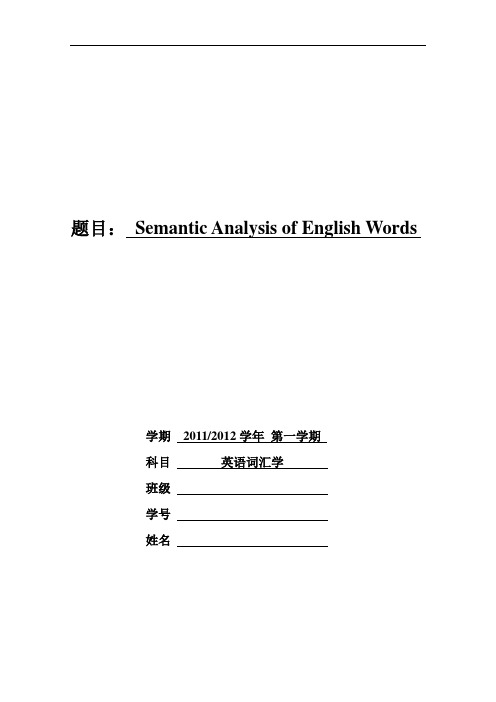
题目:Semantic Analysis of English Words学期2011/2012学年第一学期科目英语词汇学班级学号姓名摘要语言教学领域的变革从来没有停止过,而在近年变革中,其中最主要的一个变化是人们研究的焦点已经从教师的教转移到学生的学。
因此,学生自主学习能力的培养越来越受到外语教育界的重视。
同时,国家教育部提出了“优化学习方式,提高自主学习能力”的基本理念。
这样,传统的课堂教学正面临着一次巨大的挑战,并逐步被以“学习者为中心”的教学模式所取代。
不少人误认为“学生自主学习”就是“孤立地学习”或“没有教师的自学”,而有时候,学生自主能力被认为是完全独立于教师、其他学生和被认可的教学大纲,而实际并非如此。
完全的独立并不是自主能力,而是自闭。
本文首先分析了大学生英语自主学习的现状和必要性。
传统的教学方法,缺乏关注学生的情感需要导致了目前我国大学阶段的英语教学整体效率较低,成为大学英语教学的最大障碍。
接下来回顾了自主学习定义、自主学习的“最近发展区”理论、认知建构主义学习理论和罗杰斯的人本主义学习理论等。
最后根据大学生英语自主学习的现状和以自主学习的理论为基础,探讨了培养大学英语自主学习的方法,培养学生自主性的关键是要转换教师角色,创造一个宽松积极的学习氛围和进行系统的英语学习策略训练。
通过本文的研究,我们知道什么是学习动机,以及如何提高学生的学习动机。
我们要改变传统的教学理念,转换师生角色,提高学生的英语水平。
关键词:自主学习;角色转换;策略训练;大学英语I.IntroductionEver since its birth in the 1980s, the concept of learner autonomy has long been a hot topic in the field of linguistics both at home and abroad. Substantial research on learner autonomy has hence been carried out and turned out to be fruitful. It is generally accepted that language learning requires the active involvement of learners. Language can only be learned and not be taught. The focus of classroom activities has been shifting from teacher-centered to learner-centered. The goal of language teaching is to help learners to become independent from their teachers in their learning and use of language. “Although there has always been the Chinese idea of zi xue (self-teaching),the idea is different from the concept of learner autonomy and is only peripheral in the Chinese educational culture.”(Bai & Jing,P52)Learning how to learn is more important than being taught something from the superior vantage point of teachers. (Cao, P39)Furthermore, recent research in psychology, sociology and linguistics, has shedlight on language teaching, learning and the roles of learners in the language learning process. The learner-centered approach, constructivism, humanism and social cognition all support and emphasize a learner’s central place in the classroom. (Qin Shen, P9-P11)Personal construct theory holds that individual learners bring their own systems of constructs to bear on learning tasks. When learning is a matter of adding information to an existing construct, it is likely to be relatively unproblematic. When new knowledge contradicts existing construct systems, learning is likely to be more difficult and resistance may be encountered. Both in therapy and in education, resistance is overcome by helping individuals to become more aware of their existing personal construct systems and gradually to assume control of their psychological processes. In education, this means helping learners to become more aware of their assumptions about learning and to assume control of their own learning processes. Humanistic approach emphasizes the importance of inner world of the learners and affective factors in learning process. Teachers should pay attention to and respect learners with decision-making power. Learner autonomy used to be considered as a concept only suitable for Western countries, but it is now regarded as an unquestionable goal and a prerequisite for lifelong learning also in China.Over the last few decades, English teaching in China has made remarkable progress. Many educational reforms have been undertaken, new frontier language learning theories have been introduced and much research on teaching has been carried out. V arious innovative teaching methods have been explored. Even new technology like computer and the Internet has been introduced into the teaching process. The achievement of these reforms cannot be denied. Y et many problems still exist and much room for improvement remains, especially in the field of lea rner’s learning. Therefore, learner autonomy catches the eye of many researchers.However, teacher-centered approaches and spoon-fed methods have been prevalent for a long time in China’s EFL context.Teachers are regarded as authority, knowledge-givers and error correctors, while students tend to limit their work to what is taught in class. As a result, many learners are accustomed to depending on teacher’s feeding. Without teacher’s timely and adequate help, students will feel disoriented, lose confidence and fail to pinpoint their goals in learning. So there is a need for a shift in English language studies from focusing on how to teach language to how to learn it, with a consequent change of perspective from the teacher to the learner.Global changes in the availability of information indicate that there is no longer a fixed body of knowledge that can be transmitted to learners. It is no longer possible toteach all students all they need to know. Learning is a lifelong endeavor. Only when learners are able to know their situation, their learning strength, weakness and avail themselves of each learning opportunity rather than simply react to various stimuli from the teacher can they be confident enough to involve into their learning and eventually become successful language learners. The situation calls for the urgent need of fostering learner autonomy in college English teaching.II.Current Situation of English Learning and Necessity of Learner Autonomy1. Current Situation of English LearningCollege English teaching in China is still focusing on teacher’s teaching rather than student’s learning. It ignores student’s individua l variables and thus produces passive learners. Recently, with the boom in curriculum reform, more and more teachers have begun to accept new educational concepts and try new teaching methods, but influenced by traditional educational theory and exam-oriented education, China’s education reform still has a long way to go. Some existing problems need to be addressed.1.1 Teacher-Centered Classroom TeachingTeacher-centered classroom teaching is a traditional teaching style in which teaching is carried out by the teacher who is the focus of the classroom, and students only listen to him or her.In China’s EFL context, teacher-centered approaches and spoon-fed methods have been prevalent for a long time. Teachers are regarded as authority, knowledge-givers and error correctors, while students tend to limit their work to what is taught in class. Classes are usually driven by “teacher-talk”and depend heavily on textbooks. Instruction in the classroom is based on the misconception that there is a fixed body of knowledge that students must know. There is little or no room for student-initiated questions, independent thought or interaction between students. Teachers often tend to focus on teaching the target language by carefully designed steps. As a result, many le arners are accustomed to depending on teacher’s feeding. Without teacher’s timely and adequate help, students will feel disoriented, lose confidence and fail to pinpoint their goals in learning. Such situation is getting worse and worse with the expansion of college school enrolment, too many students in a class and inadequate teaching staff, who find it hard to take every student’s need into consideration.This teaching style focuses on knowledge delivery, instead of language skill training. It prevents learners from exploring their learning potentiality anddeveloping the abilities to manage their learning effectively. So there is a needfor a shift in English language studies from focusing on how to teach languageto how to learn it, with a consequent change of perspective from the teacher tothe learner.(Mo Liqun and Liu Jian, P11-P13)1.2 Exam-Oriented Language LearningSince the time we learn English, the exam-oriented system has made a lot of students feel not much interest in English. Teachers cannot escape from this notorious system either, because we have to complete the textbook within a term, and simultaneously, devote everything in the classroom to equipping students with necessary skills to get a high score in tests. Moreover, a high score in exams is considered to indicate that both teachers and students are “good”, and the prestige of parents and schools relies heavily on student’s performance. The focus of failure and extrinsic motivation sends the wrong message to students and parents. Many educators and psychologists believe that competition and comparison should not be the basis for accountability, because it puts all the emphasis on high-test scores instead of self-motivated learning for intrinsic interest and improvement. This exam-oriented language teaching decouples self-directed learning from assessments, destabilizes student’s feeling of personal responsibility and suppressed their motivations and learning at school.III.IV.…VI. Conclusion“Give a man a fish, you will feed him a day; teach the man to fish, and you will feed him for a lifetime.”Obviously, this argument shows the importance of learner autonomy.According to the paper, we can see that the current college English teaching system in China is that college English teaching is still focusing on teacher rather than students’learning. It ignores students’individual variables and thus produces passive learner. So it is important for us to shift the roles of teachers and students. And thetraditional classroom teaching should be replaced by the “learner-centered”teaching style. And the traditional exam in the field of language teaching and learning, English teachers must improve their teaching methodology and lay stress on learner’s learning in order to guide them to learn autonomously instead of learning in a passive way.According to current situation of English learning in college, teachers should shift their roles, create a relaxing and positive learning atmosphere in which students can actively involve into their language learning process, help students learn how to learn English effectively through strategy training. Only by doing this, students can finally move towards learner autonomy. In addition, English classes should be arranged in accordance with the law of human memory. In many colleges and universities, there are four or five English lessons a week. During English classes, there is no extra time to review the learning contents before. Consequently, English lesions should be added more lessons for practice. Only when students put English into practice, they can master English completely. It is suggested more English classes to learn it would be more effective.For teachers’aspect, in autonomous learning environment, the role of teachers should be identified newly. According to the current situation of the college English teaching, teachers are expected to play more various roles: guide, promoter, assessor and psychological coordinator etc. school and teachers should offer more conditions which can develop students’ faculty in autonomous learning process.It is also suggested that organization of English corner should be considered in college English teaching and learning plan. Colleges and universities should think over a complete and suitable teaching and learning system for college English. And the teaching and learning plan for college English should be more systematical, scheming and well-designed.However, language learning is a lifelong endeavor. Fostering learner autonomy in college is our long-term pedagogical goal. The author hopes this research may make contribution to the future study in this field. This paper is merely an attempt in this field and there id enormous untouched room left. With the development of science and learners. They can meet the demands for higher and higher levels of competence of English in work. And it is expected that more research will be done to accelerate students’ autonomous learning.This study is still limited, as we have only skimmed the surface of the subject called learner autonomy, and all my discussions about the ways of fostering learner autonomy in China are made only on theoretical level. But it will do great help toimprove English teaching.References[1] Bai, Shuqin and Jing, Jiangbo. Promoting EFL Learner Autonomy in China: From Theory toPractice [J]. Teaching English in China. 2003(03).[2] Benson, P. Teaching and Researching Autonomy in Language Learning [M]. Beijing: ForeignLanguage Teaching and Research Press, 2005.[3] Benson, P. and V oller, P. Autonomy and Independence in Language Learning [M]. London:Longman, 1997.[4] Candy, P. C. Self-direction for Lifelong learning [M]. San Francisco: Jossey-Bass, 1991.[5] Cao, Rongping. Respecting Individual Differences and Promoting Learner Autonomy in China’sForeign Language Teaching[J]. Teaching English in China. 2003(02).[6] Crabbe, D. Fostering autonomy from within the classroom: the teacher’s responsibility[J].System, 1993(04).[7] Dickinson, L.Self-instruction in Language Learning [M]. Cambridge: Cambridge UniversityPress, 1987.[8] Gardner, D. and Miller, L. Establishing Self-access: from Theory to Practic e [M]. Shanghai:Shanghai Foreign Language Education Press, 2002.[9] Gardner, R. Social Psychology and Second Language Learning: The Role of Attitude andMotivation [M]. London: Edward Arnold, 1985.[10] Little, D. Taking Control: Autonomy in Language Learning[M]. Hong Kong: Hong KongUniversity Press, 1996.[11] 何沂, 张利华.A New Role for Teachers in Autonomous Learning Contexts[J].内蒙古师范大学学报(哲学社会科学版), 2004(06).[12] 莫群俐,刘坚.非英语专业大学生的英语学习动机与激发策略[J].湖南工程学院学报(社会科学版),2003(01).[13] 秦琛.英语教学中多种激励方式的探讨[J].成都航空职业技术学院学报,2001(02).[14] 束定芳,庄智象.现代外语教学—理论、实践与方法[M].上海:上海外语教育出版社,1996.[15] 杨建萍.大学生学习动机的培养与激发[J].交通高教研究,2001(03).[16] 张秋玲.浅论情绪激励法在英语教学中的应用[J].嘉应大学学报,1995(04)。
2024年我国大学英语词汇教学论文
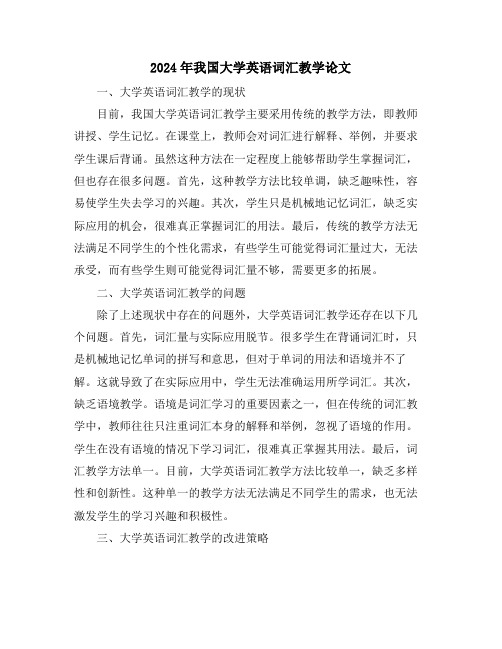
2024年我国大学英语词汇教学论文一、大学英语词汇教学的现状目前,我国大学英语词汇教学主要采用传统的教学方法,即教师讲授、学生记忆。
在课堂上,教师会对词汇进行解释、举例,并要求学生课后背诵。
虽然这种方法在一定程度上能够帮助学生掌握词汇,但也存在很多问题。
首先,这种教学方法比较单调,缺乏趣味性,容易使学生失去学习的兴趣。
其次,学生只是机械地记忆词汇,缺乏实际应用的机会,很难真正掌握词汇的用法。
最后,传统的教学方法无法满足不同学生的个性化需求,有些学生可能觉得词汇量过大,无法承受,而有些学生则可能觉得词汇量不够,需要更多的拓展。
二、大学英语词汇教学的问题除了上述现状中存在的问题外,大学英语词汇教学还存在以下几个问题。
首先,词汇量与实际应用脱节。
很多学生在背诵词汇时,只是机械地记忆单词的拼写和意思,但对于单词的用法和语境并不了解。
这就导致了在实际应用中,学生无法准确运用所学词汇。
其次,缺乏语境教学。
语境是词汇学习的重要因素之一,但在传统的词汇教学中,教师往往只注重词汇本身的解释和举例,忽视了语境的作用。
学生在没有语境的情况下学习词汇,很难真正掌握其用法。
最后,词汇教学方法单一。
目前,大学英语词汇教学方法比较单一,缺乏多样性和创新性。
这种单一的教学方法无法满足不同学生的需求,也无法激发学生的学习兴趣和积极性。
三、大学英语词汇教学的改进策略针对以上问题,本文提出以下改进策略。
首先,加强词汇应用训练。
教师应该注重词汇的实际应用训练,让学生在语境中学习词汇,了解词汇的用法和语境。
同时,教师还可以通过组织小组讨论、写作等活动,为学生提供更多的实践机会,让学生在实际应用中巩固所学词汇。
其次,引入语境教学。
语境教学是一种有效的教学方法,可以帮助学生更好地掌握词汇。
在教学中,教师应该注重语境的创设,让学生在语境中学习词汇,了解词汇的用法和语境。
同时,教师还可以利用多媒体等教学工具,为学生创造更加真实的语境,提高词汇教学的效果。
词汇对英语学习很重要作文
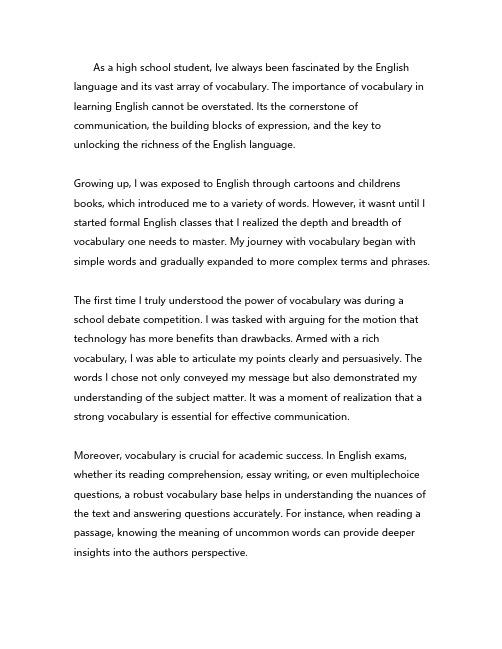
As a high school student, Ive always been fascinated by the English language and its vast array of vocabulary. The importance of vocabulary in learning English cannot be overstated. Its the cornerstone of communication, the building blocks of expression, and the key to unlocking the richness of the English language.Growing up, I was exposed to English through cartoons and childrens books, which introduced me to a variety of words. However, it wasnt until I started formal English classes that I realized the depth and breadth of vocabulary one needs to master. My journey with vocabulary began with simple words and gradually expanded to more complex terms and phrases.The first time I truly understood the power of vocabulary was during a school debate competition. I was tasked with arguing for the motion that technology has more benefits than drawbacks. Armed with a rich vocabulary, I was able to articulate my points clearly and persuasively. The words I chose not only conveyed my message but also demonstrated my understanding of the subject matter. It was a moment of realization that a strong vocabulary is essential for effective communication.Moreover, vocabulary is crucial for academic success. In English exams, whether its reading comprehension, essay writing, or even multiplechoice questions, a robust vocabulary base helps in understanding the nuances of the text and answering questions accurately. For instance, when reading a passage, knowing the meaning of uncommon words can provide deeper insights into the authors perspective.Beyond academics, vocabulary enriches our daily conversations. It allows us to express our thoughts and emotions more precisely. Imagine trying to describe a breathtaking sunset without the words magnificent, vibrant, or ethereal. The experience would be diminished. Similarly, in social interactions, a diverse vocabulary helps in conveying respect, empathy, and humor, fostering better relationships.The importance of vocabulary extends to professional settings as well. In the globalized world we live in, English has become a lingua franca for business, diplomacy, and academia. A strong command of English vocabulary can open doors to opportunities and help in navigating professional environments with ease.However, building a robust vocabulary is not without its challenges. It requires consistent effort, patience, and the right strategies. I remember the countless hours I spent memorizing new words, only to forget them later. It was frustrating, but I persevered. I started using flashcards, creating word maps, and incorporating new words into my daily conversations. Over time, these words became a natural part of my speech.In conclusion, vocabulary is the lifeblood of the English language. It is the tool that enables us to express our thoughts, engage with literature, succeed academically, and thrive professionally. While building a strong vocabulary can be challenging, the rewards are well worth the effort. As I continue my journey in learning English, I am committed to expanding my vocabulary, one word at a time, and embracing the endless possibilities that the English language offers.。
英语专业毕业论文:大学生英语词汇学习策略研究文献综述
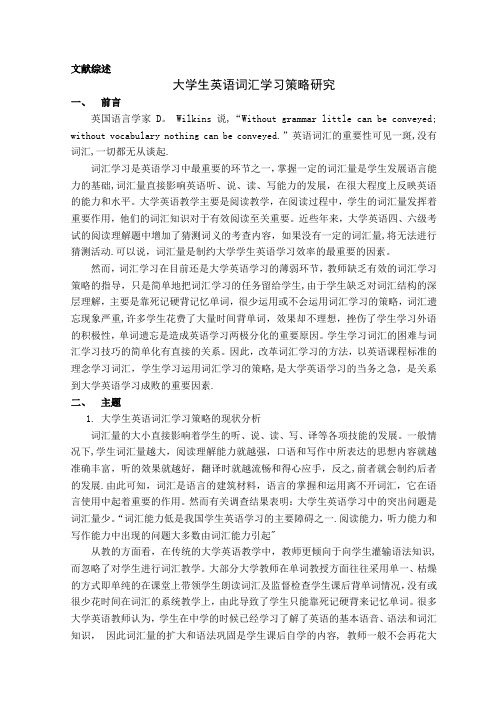
文献综述大学生英语词汇学习策略研究一、前言英国语言学家D。
Wilkins说,“Without grammar little can be conveyed; without vocabulary nothing can be conveyed.”英语词汇的重要性可见一斑,没有词汇,一切都无从谈起.词汇学习是英语学习中最重要的环节之一,掌握一定的词汇量是学生发展语言能力的基础,词汇量直接影响英语听、说、读、写能力的发展,在很大程度上反映英语的能力和水平。
大学英语教学主要是阅读教学,在阅读过程中,学生的词汇量发挥着重要作用,他们的词汇知识对于有效阅读至关重要。
近些年来,大学英语四、六级考试的阅读理解题中增加了猜测词义的考查内容,如果没有一定的词汇量,将无法进行猜测活动.可以说,词汇量是制约大学学生英语学习效率的最重要的因素。
然而,词汇学习在目前还是大学英语学习的薄弱环节,教师缺乏有效的词汇学习策略的指导,只是简单地把词汇学习的任务留给学生,由于学生缺乏对词汇结构的深层理解,主要是靠死记硬背记忆单词,很少运用或不会运用词汇学习的策略,词汇遗忘现象严重,许多学生花费了大量时间背单词,效果却不理想,挫伤了学生学习外语的积极性,单词遗忘是造成英语学习两极分化的重要原因。
学生学习词汇的困难与词汇学习技巧的简单化有直接的关系。
因此,改革词汇学习的方法,以英语课程标准的理念学习词汇,学生学习运用词汇学习的策略,是大学英语学习的当务之急,是关系到大学英语学习成败的重要因素.二、主题1. 大学生英语词汇学习策略的现状分析词汇量的大小直接影响着学生的听、说、读、写、译等各项技能的发展。
一般情况下,学生词汇量越大,阅读理解能力就越强,口语和写作中所表达的思想内容就越准确丰富,听的效果就越好,翻译时就越流畅和得心应手,反之,前者就会制约后者的发展.由此可知,词汇是语言的建筑材料,语言的掌握和运用离不开词汇,它在语言使用中起着重要的作用。
词汇学习论文现象及问题论方法与策略论文文

词汇学习论文现象及问题论方法与策略论文文词汇学习论文现象及问题论方法与策略论文文浅谈英语词汇的学习和记忆【摘要】英语学习中,词汇占有较大的比重。
英语词汇数量庞大,记忆困难,使用时也较为复杂。
文章从学习词汇的重要性和词汇学习的常见现象及问题出发,分析词汇特点,搜集整理了一些记忆方法。
【关键词】词汇学习现象及问题方法与策略在英语学习的过程中,词汇的匮乏直接影响语言能力的进一步提高,这在很大程度上影响了学生进一步学习英文的信心和决心,词汇的记忆和运用也就成为英语学习中的一个较大障碍。
事实上,英语词汇量大,很难记忆,即便是认真学习了,遗忘率也较高;而勉强记住的词汇,学生们却也不能完全正确使用。
因此,如何学习、记忆词汇并能正确运用成为了英语学习中学习者亟待解决的问题。
一词汇学习的重要性据国外权威机构测定,词汇低于6000时,语言者在进行读写及交际时会遇到巨大障碍。
而我国中学生毕业时一般只能掌握大约2000个单词。
语言学家mccarthy指出,不管一个人的语法学得多好,如果没有足够的词汇,他就无法表述自己的感情或理解对方的观点,也就无法与别人交流。
许多从事外语教学的语言学家也认同词汇在外语教学中的重要作用。
因为人们在表述某一事件时,只有通过丰富的语言,才能正确表达自己的思想和感情等。
也就是说,交际的核心不是句子平面以上的知识,而是语言知识,而词汇是核心的核心。
二词汇学习过程中常见的几种现象和问题1.同音词或近音词英语词汇中,有较大一部分词汇读音相同或相近;若是不加以注意或拼读不准确,也会影响到词汇的正确书写和运用。
如two to two (两点差两分);farther和father等等读音近或相同,而意思却有天壤之别。
2.形近词这主要表现在写作的过程中,如adapt和adopt、power和powder、ant和aunt等等;另一种情况就是不能正确运用词汇,一个词稍有变化就不能理解了,而英文词汇只有一个词性的词较少,大部分词汇都有两个或两个以上词性。
词汇学论文2篇
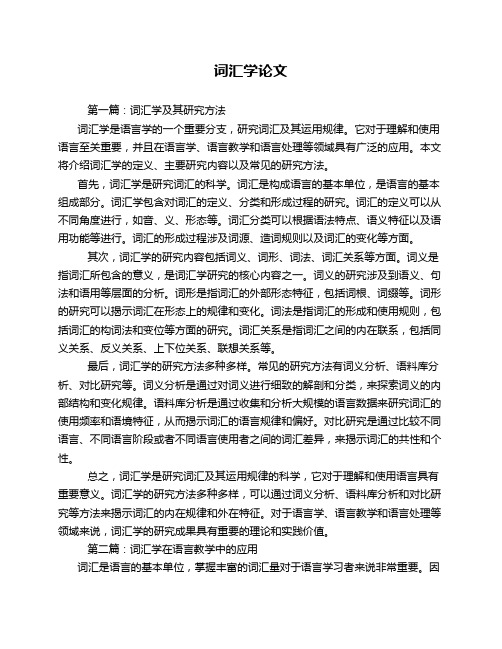
词汇学论文第一篇:词汇学及其研究方法词汇学是语言学的一个重要分支,研究词汇及其运用规律。
它对于理解和使用语言至关重要,并且在语言学、语言教学和语言处理等领域具有广泛的应用。
本文将介绍词汇学的定义、主要研究内容以及常见的研究方法。
首先,词汇学是研究词汇的科学。
词汇是构成语言的基本单位,是语言的基本组成部分。
词汇学包含对词汇的定义、分类和形成过程的研究。
词汇的定义可以从不同角度进行,如音、义、形态等。
词汇分类可以根据语法特点、语义特征以及语用功能等进行。
词汇的形成过程涉及词源、造词规则以及词汇的变化等方面。
其次,词汇学的研究内容包括词义、词形、词法、词汇关系等方面。
词义是指词汇所包含的意义,是词汇学研究的核心内容之一。
词义的研究涉及到语义、句法和语用等层面的分析。
词形是指词汇的外部形态特征,包括词根、词缀等。
词形的研究可以揭示词汇在形态上的规律和变化。
词法是指词汇的形成和使用规则,包括词汇的构词法和变位等方面的研究。
词汇关系是指词汇之间的内在联系,包括同义关系、反义关系、上下位关系、联想关系等。
最后,词汇学的研究方法多种多样。
常见的研究方法有词义分析、语料库分析、对比研究等。
词义分析是通过对词义进行细致的解剖和分类,来探索词义的内部结构和变化规律。
语料库分析是通过收集和分析大规模的语言数据来研究词汇的使用频率和语境特征,从而揭示词汇的语言规律和偏好。
对比研究是通过比较不同语言、不同语言阶段或者不同语言使用者之间的词汇差异,来揭示词汇的共性和个性。
总之,词汇学是研究词汇及其运用规律的科学,它对于理解和使用语言具有重要意义。
词汇学的研究方法多种多样,可以通过词义分析、语料库分析和对比研究等方法来揭示词汇的内在规律和外在特征。
对于语言学、语言教学和语言处理等领域来说,词汇学的研究成果具有重要的理论和实践价值。
第二篇:词汇学在语言教学中的应用词汇是语言的基本单位,掌握丰富的词汇量对于语言学习者来说非常重要。
《英语词汇学教程》论文(中文版)
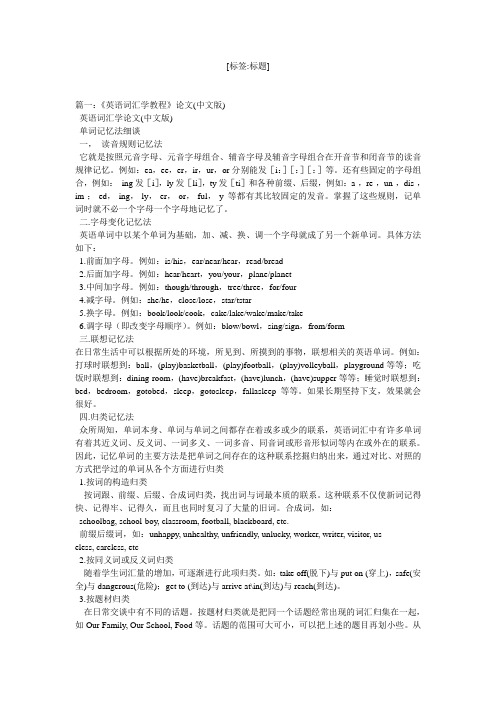
[标签:标题]篇一:《英语词汇学教程》论文(中文版)英语词汇学论文(中文版)单词记忆法细谈一,读音规则记忆法它就是按照元音字母、元音字母组合、辅音字母及辅音字母组合在开音节和闭音节的读音规律记忆。
例如:ea,ee,er,ir,ur,or分别能发[i:][:][:]等。
还有些固定的字母组合,例如:ing发[i],ly发[li],ty发[ti]和各种前缀、后缀,例如:a-,re-,un-,dis-,im-;-ed,-ing,-ly,-er,-or,-ful,-y等都有其比较固定的发音。
掌握了这些规则,记单词时就不必一个字母一个字母地记忆了。
二.字母变化记忆法英语单词中以某个单词为基础,加、减、换、调一个字母就成了另一个新单词。
具体方法如下:1.前面加字母。
例如:is/his,ear/near/hear,read/bread2.后面加字母。
例如:hear/heart,you/your,plane/planet3.中间加字母。
例如:though/through,tree/three,for/four4.减字母。
例如:she/he,close/lose,star/tstar5.换字母。
例如:book/look/cook,cake/lake/wake/make/take6.调字母(即改变字母顺序)。
例如:blow/bowl,sing/sign,from/form三.联想记忆法在日常生活中可以根据所处的环境,所见到、所摸到的事物,联想相关的英语单词。
例如:打球时联想到:ball,(play)basketball,(play)football,(play)volleyball,playground等等;吃饭时联想到:dining-room,(have)breakfast,(have)lunch,(have)supper等等;睡觉时联想到:bed,bedroom,gotobed,sleep,gotosleep,fallasleep等等。
词汇学论文(英文的)
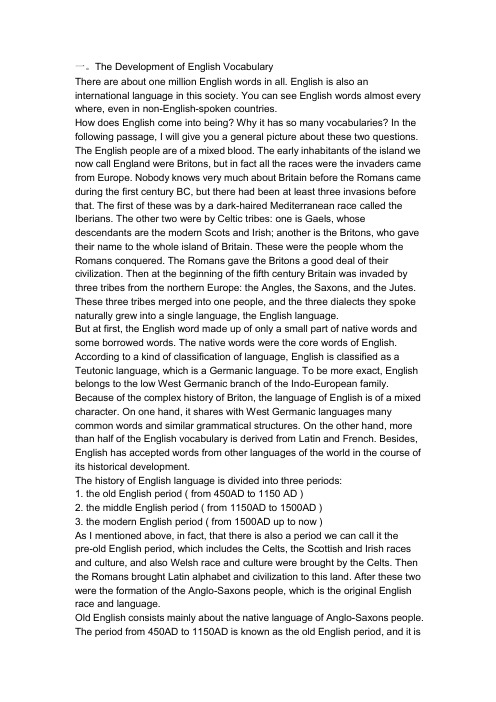
一。
The Development of English VocabularyThere are about one million English words in all. English is also an international language in this society. You can see English words almost every where, even in non-English-spoken countries.How does English come into being? Why it has so many vocabularies? In the following passage, I will give you a general picture about these two questions. The English people are of a mixed blood. The early inhabitants of the island we now call England were Britons, but in fact all the races were the invaders came from Europe. Nobody knows very much about Britain before the Romans came during the first century BC, but there had been at least three invasions before that. The first of these was by a dark-haired Mediterranean race called the Iberians. The other two were by Celtic tribes: one is Gaels, whose descendants are the modern Scots and Irish; another is the Britons, who gave their name to the whole island of Britain. These were the people whom the Romans conquered. The Romans gave the Britons a good deal of their civilization. Then at the beginning of the fifth century Britain was invaded by three tribes from the northern Europe: the Angles, the Saxons, and the Jutes. These three tribes merged into one people, and the three dialects they spoke naturally grew into a single language, the English language.But at first, the English word made up of only a small part of native words and some borrowed words. The native words were the core words of English. According to a kind of classification of language, English is classified as a Teutonic language, which is a Germanic language. To be more exact, English belongs to the low West Germanic branch of the Indo-European family. Because of the complex history of Briton, the language of English is of a mixed character. On one hand, it shares with West Germanic languages many common words and similar grammatical structures. On the other hand, more than half of the English vocabulary is derived from Latin and French. Besides, English has accepted words from other languages of the world in the course of its historical development.The history of English language is divided into three periods:1. the old English period ( from 450AD to 1150 AD )2. the middle English period ( from 1150AD to 1500AD )3. the modern English period ( from 1500AD up to now )As I mentioned above, in fact, that there is also a period we can call it thepre-old English period, which includes the Celts, the Scottish and Irish races and culture, and also Welsh race and culture were brought by the Celts. Then the Romans brought Latin alphabet and civilization to this land. After these two were the formation of the Anglo-Saxons people, which is the original English race and language.Old English consists mainly about the native language of Anglo-Saxons people. The period from 450AD to 1150AD is known as the old English period, and it isalso been called Anglo-Saxons period. It is described as the period of full inflections, since during most of this period the case endings of the noun, the adjective, and the conjugation of the verb were not weakened. Also during this period, when the Norman Conquest in 1066AD brought French to England, and much of the English vocabulary was replaced by words borrowed from French and Latin.Old English is a synthetic language. (There are two classes of languages in the world: synthetic and analytic. A synthetic language is one which shows the relation of words in a sentence largely by means of inflections. An analytic language is one which indicates the relation of words in a sentence by means of word order, prepositions or auxiliary verbs, rather than by inflections.) Old English nouns and adjectives have four cases: the nominative case, the genitive case, the dative case and the accusative case. Apart from these four cases, Latin nouns have the ablative and locative cases.Middle English period is from 1150AD to 1500AD. During this period the inflections which had begun to break down towards the end of the old English period, became greatly reduced, and it is known as the period of leveled inflections. The Norman Conquer was the cause of this change. The change of this period had a great effect on both grammar and vocabulary. In grammar English has changed from a highly inflected language to an analytic language. In this period many old English words were lost, but thousands of words borrowed from French and Latin appeared in the English vocabulary. French influence on the English vocabulary is much more direct and observable. The number of French words that came into English was very numerous. More than half of the English vocabulary is derived from Latin.Modern English period is from 1500 to the present. A large part of the original inflectional system has disappeared, and it is known as the period of lost inflections. We may divide this period into two parts: the early Modern English period and the Late Modern English period.The early modern English period extends from 1500AD to 1700AD. The chief influence of this time was the great humanistic movement of the Renaissance. In this period the study of the Latin and Greek classics was stressed, so the influence of Latin and Greek on English was great.The late modern English period started after 1700AD. The eighteenth century in England was a time of stabilizing and purifying the English language. The publication in 1755AD of A Dictionary of the English Language edited by Samuel Johnson was a typical example of consolidating and purifying the English language in this period. He set a standard for using English words in spelling, meaning and usage. In the eighteenth century French greatly influenced English. The number of French words in the period from 1650AD to 1800AD increased rapidly. Such as: ballet, cartoon, champagne, cohesion, dentist, patrol, publicity, routing, etc.Meanwhile the territorial expansion of the English empire in this period resulted in the expansion of the English vocabulary. Thus, there are many words flow into English vocabulary, which includes American Indian words, Mexican words, Peru words, Brazil words, India and African words.The nineteenth and twentieth centuries are a period of rapid expansion for the English vocabulary in the history of the English language. In this period many changes have taken place. Especially the great development of science and technology is reflected in the English vocabulary.Besides, the great changes in industry, in political and social lives, in sports and amusements all have contributed a great deal to the English vocabulary. Since the Second World War the English vocabulary has been affected powerfully by social, political, economic, especially scientific and technical changes. The English vocabulary not only changes, but also changes quickly in this period. Thousands of new words are added, existing words acquire new meaning and old words die out.Till now, the English vocabulary is still changing, some words come out and some die out. In a word, as society is constantly in a state of development, so is language. Society depends on language for its existence. As society develops new objects are created that require the invention of new words and expressions. Therefore, the changing of English vocabulary is an endless changing process.Bibliography:陆国强,published in 1999,Modern English Lexicology (new edition)Adams, Valerie, published in1982,An Introduction to Modern English Word-formation戴炜栋,published in 2002,A New Concise Course on Linguistics for Students of English朱永涛,published in 1997,The Society and Culture of Major English-speaking Countries林承璋,published in 1987,An Introduction to English Lexicology也可以写广告中的词汇特点:The Lexical Features of Advertisement on NewspaperNewspapers are generally the cheapest way to reach a mess audiences,and the timing is fast.Adverments make an important part on English Newspaper.We live in a world of advertising.Advertising provides a valuable service to society and its members,because it defines for consumers the meaning and the role of products,services and institutions.Newspaper advertisements’ main text use words for the spread of vector,and must must be simple eye-catching,because of the layout of resources.To some extent,thenewspaper advertisements content mainly rely on language toexpress.Advertising language ,playing a role of communication and persuasion,has developed its own features.Naturally,advertisements in English have become an important means of communicatingideas,demoinstrating a variety of linguistic features of its own.The present study discusses some lexical features of English advertisement texts.ⅠChoose the simple wordsAdvertiment language must be easily understood terms so that readers can get information as soon as possible.In advertising,simple words can win the consumers by their exact,effective expression an d a kind of closeness.E.g.①Take time.Any time.Continuous using two “time” can make the language simple and clear.②Once tasted,always loved.The article should be clearly and concisly understood in order to arouse the interest of customers on food which make them mouth-watering.③My goodness!My Guinness!Common language facilitate people to memory and speak,this reproduce the scene of people driking the Guinness beer which is full of praise.ⅡFrequent Employment of Simple VerbsSimple verbs are frequently employed in English advertisements, which is an obvious wording characteristics of English advertising texts.Verbs are the most important part of language.It is a prominent feature in adervertising english that verbs are regularly used for the ultimate goal of advertising ,which is to enable consumers to buy their goods.So in terms of the using of words,dynamic and strong word will produce a better feeling effects.Verbs can be used to “touch”the consumer's heart.In this way,they will have impules to buy the goods.E.g.①Drink Coca-Cola.②I want you to sponsor a Rice Paddy Baby.③For incredible speed and accuracy, try the Minolta 7000, the world’s first body-integral auto-focus SLR.In the above examples, “try”,”sponsor” and “drink”are to fulfill the “get action” requirement seem more euphemistic and even more attractive.④Get noticed. Get results.⑤Feel the Hyatt Touch.⑥Send today for your free sample, and try the new flavor.After reading the above ads, we feel encouraged to take buying action or make repeated purchases. The active voice doesn’t force people to take the passive action while it makes people feel that they do something of their own accord. Ⅲ. Adjectives⑴It is hard for us to think of any really persuasive message without the use of descriptive and vivid adjectives. Copywriters like to use a large number of adjectives not only to describe the quality and features of the products or services, but to a great extent to praise and beautify them.E.g.For people who care about their bodies, Dairy Farm brings fresh skimmed milk. With almost no fat, it keeps your body fit inside and outside, fresh skimmed milk. Fresh Dairy Farm.The adjective “fresh” in Example appears three times to emphasize how fresh the product is, making its quality particularly attra ctive. And the adjective “fit” points out the remarkable function of the product.⑵The copywriter tends to select the superlative or comparative forms of adjectives that carry positive meanings so as to make a comparison and stress the wonderful qualities of the advertised product. E.g.①Using Dove, I do feel 20 years younger.“Younger” just emphasizes the magic power of the product.②Discover the season’s newest splendor.The word “newest” , which is an advertisement of a kind of perfume, means “fashionable to the highest degree”.Of course, the advertisers must make sure that the advertised goods or services are actually the best in the same category.Sometimes people do not know how superb the goods or the services are in quality. Anyhow, people tend to believe what is said in advertisements.Ⅳ.New Words Constantly AppearIn order to attract people’s attention, copywriters like to create some new words which are more active. The new words are mainly used for truthfulness, humor or emphasis in English advertising texts. E.g.①Surefit Shoe Ltd.“Surefit” is a new word which makes consurms thing of a sentence”Surely to fit your feet”.That means the shoes are fot for your feet.②Give a Timex to all, and to all a good time.The well-known watch brand “Timex” is a variation of “Time + Excellent”, wh ich persuasively shows the merit of the watch brand. Thus, brand names get and retain a unique image.Ⅴ.PronousPronouns of the first and second person: we, I and you outnumber the other pronouns in advertisements. It is because that you, we and I help create a friend-like intimate atmosphere to move and persuade the audience. The audience will easily accept a product, a service or an idea as if a good friend recommended them.Sometimes,we use infinitive pronouns,such asall,everyone,none,nothing and so on in order to feflect the extraordinarycharacteristics of a particular commodity or it has been spending and receiving most of people.E.g.Our finest time.It is about a well-known red wine.A pair of lover drink together at romantic atmosphere.Ⅵ.Compound wordsA compound word is often a noun or an adjective made up of two or more words which are frequently used to express more information in limited space. Especially,compound adjectives are often seen in advertisements.E.g.Kodak Single-use-came ras take pictures where you wouldn’t normally take your camera.It used the compound word skillfully and describe the capability and function of the product incisively and vividly.Now we have briefly discussed the six wording characteristics of English advertisements. We have got to know that simple verbs and concise adjectives are very important words in English advertising, and that new words which are attractively used to stress the new and special qualities or functions of the advertised products. Language in advertising presents us with a colorful, interesting and wonderful world in order to serve the purpose of attracting advertising readers. Of course, besides the above features discussed in this study, there is much more for further study in advertising language.Email:********************。
英语词汇学论文(1)
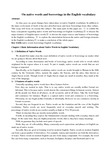
On native words and borrowings in the English vocabulary AbstractAs time goes on, great changes have taken place in native English vocabulary. In addition to the inner evolvement of itself, it has also absorbed more and more borrowings from other culture. This essay will focus on exactly this subject. The main parts in this paper are: ①to exhibit the basic conceptions regarding native words and borrowings in English vocabulary;②to discuss the major features of English native words;③to discuss the major sources and features of borrowings in the English vocabulary; ④to explore the interrelation between the native and foreign elements in the English vocabulary.⑤to make a conclusion of the whole paper.Key words native words borrowings English vocabularyChapter 1 Basic Information about Native Words in English Vocabulary1、1 Definition of Native WordsWe should first make clear the exact definition of native words or borrowings no matter what we are going to discuss about them next.According to some dictionaries and books of lexicology, native words refer to words which originated in the region where it is used. To put it simple, native words are words that are not foreign or imported.Specifically, as for English vocabulary, native words are words brought to Britain in the fifth century by the Germanic tribes, namely the angles, the Saxons, and the jutes, thus known as Anglo-Saxon words. Though words of Anglo-Saxon origin are small in number, they stand at the core of the language.1、2 Features of native wordsGenerally speaking, native words have these features below:First, they are neutral in style. That is to say, native words are usually neither formal nor informal. This is because native words denote the commonest things in human society. Almost all the people use them in all places, on all occasions, and at all times. Take the word begin and commerce for instance. Begin is a typical native word and commerce is a borrowing.Obviously, we use begin neither formally or informally. However we use commerce mostly in formal occasions.Second, they are frequent in use. Native words are the foudation and the core of the English vocabulary. Native words are most frequently used in everyday speech and writing. The percentage of native words in use reaches usually as high as 70 to 90 percent.Third, in structure they are mostly monosyllabic words.Fourth, in meaning they express the fundamental concepts dealing with everyday objects and things. At the same time, they are highly polysemic words, that is, they have many meanings.Fifth, in grammar they include most parts of speech.Sixth, they are of collocability. Many commonly-used expressions and phrases in English are made up of native words.Seventh, they are good at forming word in modern English. Native words in modern English can form a great number of derivatives. For example, watery and waterless are both the derivatives of water. Native words in modern English can also form many compounds. For example, the word fire can form many compounds, such as fireman, firefighter, fireplace and firebrand and so on.Chapter 2 Basic Information about Borrowings in English Vocabulary2.1 Definition and Main Features of BorrowingsBorrowings, or borrowed words, or loan words, refers to the words taken from foreign language.As a language which owns the most speakers, English has adopted words from almost all other major languages in the world. As is stated in Encyclopedia Americana, “the English language has vast debts. In any dictionary some 80% of the entries are borrowed”. Thus the English language is called “a heavy borrower”. Here “borrowing” is not real “borrowing”. It has nothing to with returning. It’s merely a metaphor stands for the foreign words from a different culture. But not all foreign words do become borrowings. If they fall out of use before they become widespread, they do not reach the borrowing stage.Through analyzing the borrowings in English vocabulary, we can find some common features among them.First, borrowings in English vocabulary usually do not have relative native words with the same meaning with them. When this is the case, certain concepts, ideas or objects of the “lending”language community are new to the people of the “borrowing” language community. So instead of making up a complete whole new word for the idea or object they simply borrow the word from the people they came in contact with.Second, borrowings are usually words that refer to exotic ideas, concepts or objects. An example of this is how names of animals that do not inherently come from Great Britain are often loanwords in English. The name of the animal is borrowed from the language that is spoken in the country in which the animal originally comes from or lives in.Third, most of the borrowings in English vocabulary are nouns. Nouns and lexical words in general, are borrowed more frequently than grammatical words. An example of this is the word “bagel”. The word was adopted from the Yiddish language, since the Jews were those who introduced bagels to the rest of the world. Many other languages, including English, therefore borrowed the word “bagel”.Fourth, borrowings are often even more widely known than native words since their borrowing served a certain purpose, for example to provide a name for a new invention. An example of such a borrowing is “pizza”. Since the Italians were those who introduce pizzas in England, the England borrowed the word from them.2.2 Major Sources of Borrowings in the English VocabularyTo discuss this question, we should first get to know the exact meaning of “source of borrowing”. Here it refers to the place where the borrowing was borrowed.Generally speaking, Latin, Greek and French are the three languages that have contributed most to the English language. Other foreign languages that have contributed words are of less importance.That is to say, Latin, Greek and French are the three main sources where borrowings in English vocanulary come from. Apart from the three, Scandinavian, Celtic, Dutch, Low German, Arabic, Persian, Portuguese, Spanish are also the main sources of borrowings in English vocabulary. Some examples of borrowings in English voabulary are as follows.Among those borrowings that come from the Germanic are the words father, mother, brother, man, wife, tree, grass, summer, winter, bring, come, get, hear, meet, and think and so on.Such words as constitution, president, parliament, congress, city, place, , diner, café, liberty, veracity, carpenter, draper, haberdasher, mason, painter, plumber, and tailor are from France.English has acquired many words from Spanish. Some of these have been borrowed directly: cigar, armada, guerrilla, matador, mosquito, and tornado.Borrowings from Latin have been especially numerous. Many of these represent combinations of Latin words: alnutrition, transfer, circumference, supernatural, submarine, suburb, substantial, contemporary, multilingual, conjunction, compassion, and hundreds more.Borrowings from Greek are heavy in the sciences and technology. In addition to macro and micro, often-used prefixes include poly and tele. Among the well-known English words from Greek are alphabet, geometry, geology, photography, psychology, pathology, biology, philosophy, telephone, logistics, and metamorphosis.Among the common English words that have come from Arabic are: alcohol, alchemy, algebra, alkali, almanac, arsenal, assassin, cipher, elixir, mosque, naphtha, sugar, syrup, zenith, and zero.Borrowings in English vocabulary are so numerous that they can not be listed one by one The above are the language sources that English vocabulary comes from. Below are the specific sources or we’d better say specific channels that borrowings come from. Generally speaking, English vocabulary mainly comes through conquest, commerce, travel, literature, mass media or some other ways. In other words, those borrowings have come into English vocabulary through the spoken word, on one hand, and through the written word, on the other hand.Chapter 3 The Interrelation between the Native and Foreign Elements in the English VocabularyIn fact, no language has so complex and varied a vocabulary as English. The English vocabulary has been adopted from more than fifty languages. As a cosmopolitan language English has no rival. That is to say, up to seventy percent of the English vocabulary consists of loan-words, and only thirty percent are native words.In spite of large-scale borrowings, it is the native words that form the basic stock of modern English vocabulary. And what’s more, native words are used in everyday speech and writing more frequently than borrowed words.Generally, the longer a borrowed word has been in the language, and the more frequently it is used, the more it resembles the native words of the language.In the course of historical development borrowed words have extended the total number of the English vocabulary, and Latin or Greek roots, prefixes or suffixes have changed the structures of English words.Chapter 4 conclusionTo sum up, we can say that English vocabulary has been marked by the word ‘borrowing’. Since early times, English has been in contact with other languages such as Greek, French, Scandinavian, Celtic, Dutch, Low German, Arabic, Persian, Portuguese, and Spanish and so on, and as a result, English vocabulary has been riched under the influence of other languages. It is native words and borrowings together help strengthen the English vocabulary and make it a very open and the most poewrful language in the modern world.Bibliography参考书目??/~kemmer/Words04/structure/borrowed.htmlhttp://www1.ku-eichstaett.de/SLF/EngluVglSW/grzega1032.pdfhttp://dooku.miun.se/engelska/englishC/C-essay/VT06/Final/NicoleFerm.pdf/~kemmer/Words/loanwords.html/media_file/200708/huashi/0809/cihuix/web/unit02.htm。
英语词汇学引论论文
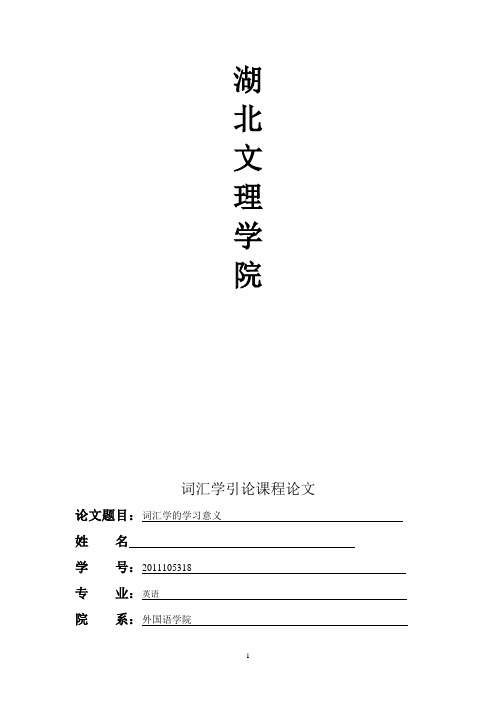
湖北文理学院词汇学引论课程论文论文题目:词汇学的学习意义姓名学号:2011105318专业:英语院系:外国语学院目录摘要 (3)关键词 (3)引言 (3)文献回顾 (3)第一章第二外语学得与外语教学工作的关系 (3)第二章英语词汇学重要内容简述 (4)第三章词汇学在第二语言学习中的作用 (5)1、构词法在第二语言学习中的作用 (5)2、词义变化在第二语言教学中的作用 (6)3、英语成语在第二语言教学中的作用 (7)第四章结语 (8)参考书目 (8)摘要:英语词汇普遍存在,无论是诗歌,还是散文等文章都是由词汇组成的。
英语词汇它存在于生活中的每一个地方,在人类的生活中起到了至关重要的作用。
这引起了语言学家的关注,经过不停的总结与分析最终发现词汇对语言发展的积极作用。
尝试将词汇学加入到日常教学中。
关键词:英语词汇学内容作用教学引言:词汇是语言的三大要素之一,在语言学习中起着重要作用。
英国语言学家威尔斯金曾说过:“没有语法,人们表达的事物寥寥无几,而没有词汇,人们则无法表达任何事物。
”词汇在语言中占有如此重要的地位,因此对词汇教学进行研究具有重要意义。
所有英语的学习者都清楚,学好英语必须学习大量的词汇。
但面对如此多的生词时,我们时常感到困惑、烦躁,因此学会一些有用的词汇学知识,使之应用于词汇学习就显得特别重要。
本文主要从词汇学的角度,采用构词法理论和语篇中的词汇衔接理论来研究英语词汇。
本文将通过对大量词语的分析、研究来论述词汇产生的原因、背景,在此基础上并试图发现词汇发展的特点。
本文期望能具有一定的实用价值,使英语学习者对词的构成及衔接有比较清晰的认识,同时能激发英语学习者学习英语词汇的兴趣,帮助其有效扩大词汇量,灵活掌握英语词汇。
文献回顾:作为一种语法现象,英语插入语引起了众多语法学家的关注。
本文拟从四个章节研究英语词汇及词汇学习。
论文第一章主要介绍二语学得与外语教学工作的关系。
接下来第二章是英语词汇学重要内容简述。
英语词汇学论文(浅谈英语词汇的发展)

英语是当今国际性最强的语言。
对学习英语的人来说,简单了解一下英语词汇的发展过程,对英语知识的掌握会是一个很大的促进。
英语是当今国际性最强的语言。
在全世界用得最广的10种语言中,英语居首,虽然说汉语的人数占世界首位,但说英语的人在世界上分布最广。
对学英语的人来说,简单了解一下英语词汇的发展过程,对学习英语不仅是一个很大的促进,而且随着英语在我国经济、商业各部门的地位Et趋重要,对英语词汇的发展有个大概的了解,会为较快地扩大词汇量,掌握更多的英语知识铺平道路。
一种民族语言及其词汇的发展与民族的历史密切相关。
要了解英语词汇的发展史,不可避免地跟整个英语的发展史,及至英国的历史是密不可分的。
不列颠群岛的最早居民是克尔特人。
公元前55年,罗马人在凯撒大帝的率领下入侵不列颠群岛,克尔特人被赶入威尔士和苏格兰的深山之中。
这一时期,在英国历史上称为罗马占领时期。
直到公元410年,罗马占领时期才告结束。
随后,来自德国北部平原的三个13耳曼部落盎格鲁人、撒克逊人和朱特人开始来到不列颠定居,英语就是盎格鲁——撒克逊人的语言。
语言史家一般把英语的历史分为三个时期:古英语时期;中古英语时期;现代英语时期。
一、古英语时期:又称盎格鲁——撒克逊时期。
13耳曼部落在不列颠定居以后,各自占领了一地区。
盎格鲁人占领了泰晤士河以北的英格兰大部地区和苏格兰的低地;撤克逊人占领了泰晤士河以南的大部分地区;朱特人占领了肯特郡一带地区。
由于全国长期没有统一,所以,古英语时期存在着多种方言,其中撒克逊语曾一度占主导地位,在英语形成过程中起了重要作用。
古英语的词汇有着浓厚的13耳曼语族的特点,这主要表现为复合法是重要的构词方法,复合词在古英语词汇中占有显著地位。
据统计,在英语史诗《贝奥伍夫》的3000行诗句中,竞有1069个复合词,像fifteen,Sunday,Monday等都在其中。
古英语时期有两个重要历史事件给英语词汇带来较大影响。
第一件事是基督教传人英国。
大学英语词汇教学论文

大学英语词汇教学论文一大学英语词汇教学的问题与不足目前的大学英语词汇教学的形式比较单一,教师对于词汇的讲授方法还只停留在发音、词汇构成和字面意义上。
通常在上课时,教师仅从头到尾领读一遍单词,矫正学生的发音,然后为学生讲解单词的词缀结构和表层含义。
整个词汇教学并没有把跨文化交际意识融入到单词讲解中,对词源缺乏系统的讲解,对词汇的引申含义没有过多的涉猎。
然而,跨文化交际的能力培养是十分重要的,这项能力被列为外语学习的主要内容之一。
早在2007年教育部颁布的《大学英语课程教学要求》中就已提出,“大学英语是以外语教学理论为指导,以英语语言知识与应用技能、跨文化交际和学习策略为主要内容,并集多种教学模式和教学手段为一体的教学体系。
在词汇教学中,忽视了对学生跨文化交际能力的培养会产生很多问题,导致词汇误用或误解的现象频发。
二词汇与文化的关系语言作为文化的载体,不能脱离文化范畴而单独存在。
而词汇又是构成语言的基础单位,词汇的不同排列组合可以体现不同的文化内涵。
词汇,又称语汇,是一种语言里所有的(或特定范围的)词和固定短语的总和。
有些词汇具有全球共性,无论在任何语种内都指代某种特定的物件,它的文化性与独特性不突出,这样的词汇是非文化词汇(non-culturalvocabu-lary),如pencil,table,flower等,在任何语种中都能找到相对应的词汇。
但还有相当一部分词汇是在一个地区、国家或民族特有的文化现象中产生或经过其领域内重大事件的引用而产生新的对此重大事件有代表性的词汇,我们把这种词汇称为文化词汇(culturalvocabulary),如Americandream,bloodyMarry 等。
因此,大学英语教学必须从多个层次进行,在帮助学生了解语音和语法的基础上,还要强调文化导入的语义教学,单词的讲解除了其字面意思之外,更要有适度的扩充与延伸。
由于英语词汇和汉语词汇的含义大多不能完全对应,文化词汇占大多数,因此在词汇教学中必须融入跨文化交际意识才能让学生对单词的内涵、使用范畴、交际习惯和交际规约等有更加全面的把握。
英语词汇学硕士论文范文
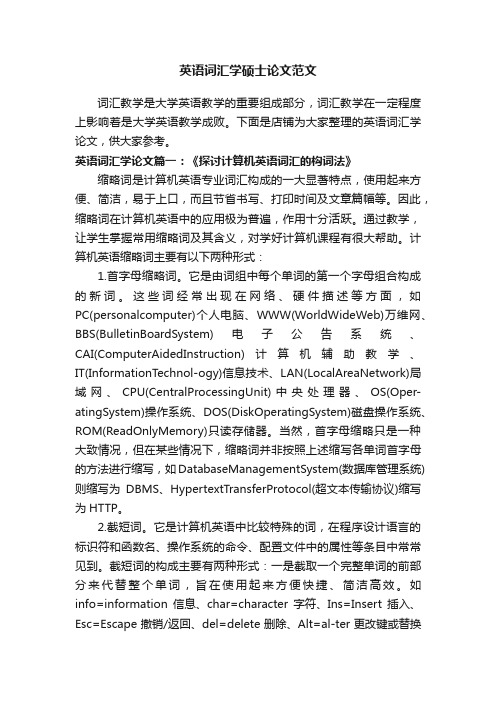
英语词汇学硕士论文范文词汇教学是大学英语教学的重要组成部分,词汇教学在一定程度上影响着是大学英语教学成败。
下面是店铺为大家整理的英语词汇学论文,供大家参考。
英语词汇学论文篇一:《探讨计算机英语词汇的构词法》缩略词是计算机英语专业词汇构成的一大显著特点,使用起来方便、简洁,易于上口,而且节省书写、打印时间及文章篇幅等。
因此,缩略词在计算机英语中的应用极为普遍,作用十分活跃。
通过教学,让学生掌握常用缩略词及其含义,对学好计算机课程有很大帮助。
计算机英语缩略词主要有以下两种形式:1.首字母缩略词。
它是由词组中每个单词的第一个字母组合构成的新词。
这些词经常出现在网络、硬件描述等方面,如PC(personalcomputer)个人电脑、WWW(WorldWideWeb)万维网、BBS(BulletinBoardSystem)电子公告系统、CAI(ComputerAidedInstruction)计算机辅助教学、IT(InformationTechnol-ogy)信息技术、LAN(LocalAreaNetwork)局域网、CPU(CentralProcessingUnit)中央处理器、OS(Oper-atingSystem)操作系统、DOS(DiskOperatingSystem)磁盘操作系统、ROM(ReadOnlyMemory)只读存储器。
当然,首字母缩略只是一种大致情况,但在某些情况下,缩略词并非按照上述缩写各单词首字母的方法进行缩写,如DatabaseManagementSystem(数据库管理系统)则缩写为DBMS、HypertextTransferProtocol(超文本传输协议)缩写为HTTP。
2.截短词。
它是计算机英语中比较特殊的词,在程序设计语言的标识符和函数名、操作系统的命令、配置文件中的属性等条目中常常见到。
截短词的构成主要有两种形式:一是截取一个完整单词的前部分来代替整个单词,旨在使用起来方便快捷、简洁高效。
大学英语词汇的教学论文

大学英语词汇的教学论文大学英语词汇的教学论文论文摘要:词汇教学是大学英语教学中的重要一环,现有词汇教学不容乐观,通过介绍联结法、通过语境学习法、词块法和构词法四种基本方法,以期改善词汇教学。
论文关键词:词汇教学,联结理论,语境,词块,构词法众所周知,词汇在大学英语学习中的重要性是不言而喻的。
在大学英语学习的过程中,学生掌握词汇知识的多少将对他们听、说、读、写、译等各项技能的发挥有直接影响。
近些年来,国内外众多的二语习得研究者在词汇习得方面进行了大量的专门细致的研究,并已取得累累硕果,具体表现为涌现了大量的新理论、新教材以及各种词汇练习册和词汇记忆软件。
目前,我国的大学英语教学整体上还未能令各方面满意水平还不是很高。
笔者认为,其中一个很重要的原因就是他们的词汇,即其掌握的词汇知识和运用词汇的能力无论是在广度还是深度上都满足不了交际的需要。
因此,大学英语教学中的词汇教学是提高大学英语整体教学质量的重要一环。
笔者在阅读了大学英语词汇教学相关的书籍和论文的基础上,结合自己在大学的教学实践,先指出现在大学教授大学英语词汇知识时主要存在的几个问题,接着提出自己的解决途径,希望能对广大师生有所启发。
一、不容乐观的大学英语词汇习得现状笔者认为,影响大学生习得词汇主要分为两个大的方面,一是教师,二是学生本身。
首先,现在大学英语词汇教学还存在很多的问题。
在一些学校的英语教学中,教师处理词汇的方法还是很死板枯燥。
尽管大学英语教学大纲和教材上都有相关的明确要求,但很多教师观念没有更新,仍然只是机械地带读单词的发音、讲解其拼写和意思,甚至就一个单词,可以写上一黑板的例句。
这种完全按照课本教单词的单一方式完全没有效率,没有培养学生思维和联想的能力,也不利于学生记忆和掌握单词的用法。
其次,很多学生没有掌握科学的记忆单词的方法。
笔者在教学过程中,经常听到有学生反映,认为自己在大学阶段词汇量的几乎没有增加,不仅很难记住生词或者记了很快就忘,甚至于把中学学过的很多单词也忘记了。
- 1、下载文档前请自行甄别文档内容的完整性,平台不提供额外的编辑、内容补充、找答案等附加服务。
- 2、"仅部分预览"的文档,不可在线预览部分如存在完整性等问题,可反馈申请退款(可完整预览的文档不适用该条件!)。
- 3、如文档侵犯您的权益,请联系客服反馈,我们会尽快为您处理(人工客服工作时间:9:00-18:30)。
大学英语词汇学习论文
摘要:本文指出,词汇是大学英语学习的关键,但是大学生在英语词汇学习中容易碰到语言、多义、同义词和文化差异的问题,可以通过关键词策略、单词表策略、语境学习策略和利用图像与想象策略来提高词汇学习的效果。
关键词:大学英语;词汇学习;问题;策略
词汇是语言三要素(语音、词汇、语法)中最重要的。
没有词汇,就无所谓句子,更无所谓语言。
正如语言学家威尔金斯(Wilkins)所言“没有语法,表达不了多少东西;没有词汇,就什么也表达不了。
”
一、大学英语词汇学习过程中的主要问题
1、语音问题
首先,由于种种原因,英语中有些词的音和形不一致。
如woman、some、fiancé、kimono等等。
其次,英语中有些音是汉语中没有的,最著名的例子是[θ]和[e]。
最后,有些词读音相同(如:meet“遇见”和meat“肉”)或相近(如:four nights“四个晚上”和fortnight“两星期”),但意义完全不同;有些词在担当不同的语法功能时读音不同(如:record,作动词时读作[ri'k:d],作名词时读作['rek:d]);还有一些词在表达不同的意义时读音不同(如:tear,读作[tε.]时,是动词,意为“撕裂”;读作[ti.]时是名词,意为“眼泪”)。
2、一词多义
以基本词汇take为例,在《朗文当代英语词典》中可找到如下意义:携带,带去,移动;拿走;捉,俘虏;取得,获得;握,抓;接受;忍受;需要,耗费;测,量;记录,写下;凑效,起作用,等等。
3、同义词或近义词
例如continual、continuous、successive & constant均有“连续的”、“不断的”之意。
continual强调重复或持续发生,但连续之间允许有间断。
语意最强,强调在时间和空间上没有间断。
successive强调事物一个接一个地发生,无间断。
constant多指习惯性的重复和不变的持续。
4、文化差异
不同的语言具有不同的民族特性,语言的民族特性自然会由词汇反映出来,这就使得词汇具有了该民族独特的文化内涵。
不同的文化必然造成不同的表达。
二、大学英语词汇的学习策略
1、关键词法策略
关键词法能够极大地促进以外语单词为线索的外语释义的提取,它是一种有效的外语词汇记忆策略。
但是由于英语和汉语之间存在着巨大的差异,母语为汉语者在记忆英语等外语词汇的过程中,不宜直接照搬关键词法。
王文宇(1998)的调查发现,中国学生很少使用关键词法。
她认为,关键词法不受学生欢迎的原因可能与关键词法操作复杂有关。
关键词法通过联想一个外语词和它在学习者母
语中的同音词之间的形象联系起来记忆这个外语词。
由于找出两种联系费时费力,所以学生可能会因此放弃使用这种方法。
英语和汉语分属不同语系,英语的词汇大多是多音节词,而汉语词汇单音节词很多,所以在汉语中找一个与英语单词读音类似又有意义的词非常困难。
总的说来,关键词法有其特有的使用范围,并不是所有的词都适用,但适当地运用有利于单词的记忆。
2、单词表策略
Nation(1982)对词汇表法进行了研究并得出结论:词汇表法应该是短时间内积累大量词汇的有效方法。
OMalley和Chamot(1985)认为死记硬背法也应该是一种有效的记忆单词的方法。
单词表策略是相当原始的机械记忆策略。
它将所要记下的单词连语义、词性逐个抄录,汇总成表,或利用现成的词汇表,用时只念不写。
采用本策略有两种做法。
一种是每次从头到尾读一遍,一词不漏,另一种是一边念一边背,然后在已学会的单词前做记号,下次背的时候就只背没有做记号的单词,这样要背的单词一遍比一遍少,最后集中精力突击几个最难的,然后再从头到尾检查一遍。
显然后一种做法要比前一种好。
但是该策略本身有缺陷,由于单词一经列表,排列顺序就固定下来了。
所以,有时在单词表上学会了的单词单独抽出来后却发现没有真正掌握。
要彻底解决这个问题最好把单词表改成单词卡,即每个卡片上一个单词,卡的顺序可以任意打乱。
3、在语境中学单词策略
词汇意义的理解是离不开语境的,不论是语言语境(语言内语
境),还是非语言语境(语言外语境),对词汇意义的理解都起着重要的作用。
在语境中学单词的策略可以通过语境加深对单词的理解和记忆。
首先,利用上下文里的同义词或近义词来猜测词义。
其次,可以利用上下文单词之间的指代关系,如指示代词、连词等功能词来确定单词与单词之间的关系,从而猜测单词的意思。
最后,可以利用上下文中的词与词之间的搭配猜测词义。
词与词之间的搭配是有规律性的,同时带有一定的局限性,所以可以根据一些固定搭配的用法猜测出词义。
比如能跟在动词drinking后面的名词为数不多,基本上都是水和饮料之类的东西。
如果某个生词仅接在drinking之后,基本上可以断定这个词表示某种可以喝的东西。
这就决定了语境制约着词汇的选择、意义的表达与理解。
词典中对单词、短语的解释是从语境中抽象、概括出来的,它们已经失去词语本身的具体性。
词语意义必须在上下文中才能精确化、具体化。
因此,语境对语义理解和语言运用具有重大的意义。
4、利用图像或想象加深词汇的理解和记忆
对于人物、动物、物体等具体名词,如果能借助图片学习单词,理解和记忆的效果会更佳。
这就是为什么很多英语教材经常用图片而不是直接用文字来展示单词的意思。
但是,英语学习中并不是每遇到一个生词就能找到一幅相应的图片。
所以,学习者要借助单词释义或进行想象,在头脑中形成一种影像。
学习某个单词时,如果学习者能够成功地想象并对这个单词代表的人或物形成影像,将来再遇到这个单词时,也许不记得这个词的文字释义,但可能记得这
种影像,因为视觉信息比文字信息容易记忆。
对多数学习者来说,对具体的人、物或动作进行合理的想象并不困难,但是对抽象的词或短语的意义进行想象则不那么容易。
这正是需要训练的词汇学习策略之一。
参考文献:
[1] 苏远连.论听力学习策略的可教性[J].现代外语,2003(1)
[2] 吴霞、王蔷.非英语专业本科学生词汇学习策略[J].外语教学与研究,1998(l)。
